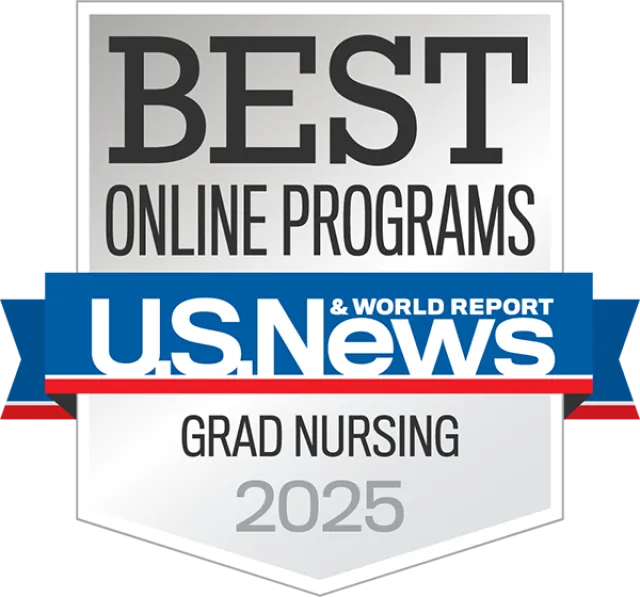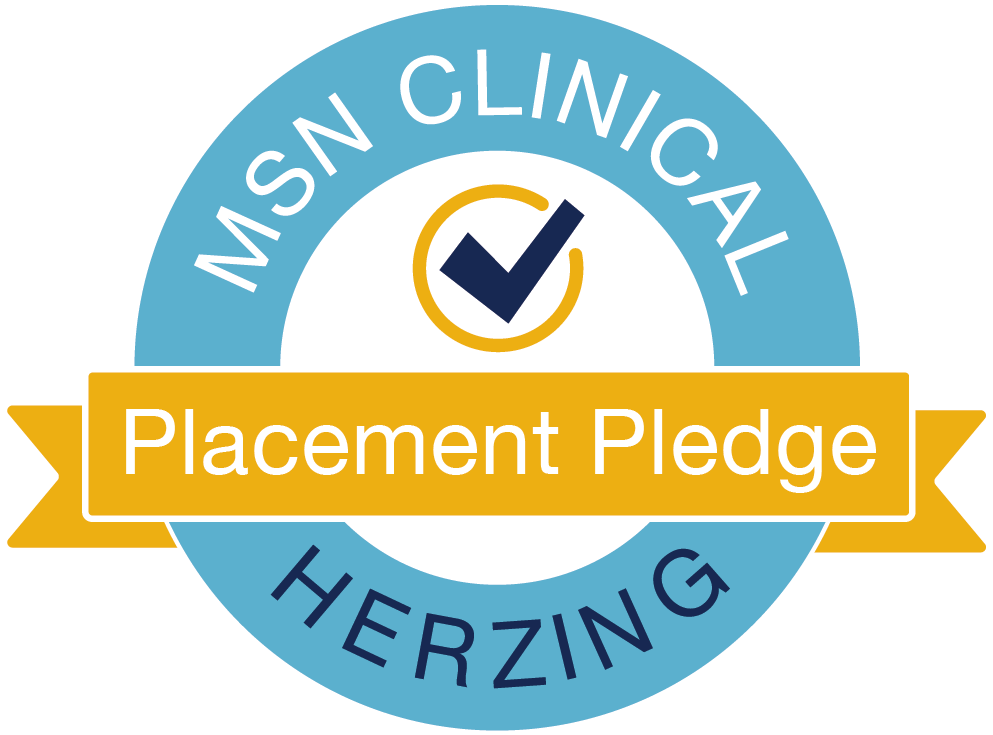Become a primary care provider in less than 2 years
| Accreditation | CCNE accredited,1 Accredited by the Higher Learning Commission |
|---|---|
| Clinicals | We pledge your clinical placement |
| Format | 100% online coursework with 540 clinical hours |
| Immersion Exp. | 180-hour, 16-week immersion experience to prepare you for your first AGNP job |
| Dual credit | Earn dual credit towards a Doctor of Nursing Practice (DNP) or choose our BSN to DNP-AGPCNP program |
| Certification | Prepare for key industry certifications: the Adult-Gerontology Primary Care Nurse Practitioner (A-GNP) certification from the American Academy of Nurse Practitioners (AANP), and the Adult-Gerontology Primary Care Nurse Practitioner Certification (AGPCNP-BC) from the American Nurses Credentialing Center (ANCC) |
| QuickPaths | Transfer credit, stackable credentials, and adaptive learning technology build a faster pathway to a higher education with Herzing University |
Learn More Today!

Ranked by U.S. News & World Report as one of the best online graduate nursing programs in 2025
Overview: Online MSN-AGPCNP Program
The MSN-AGPCNP degree (BSN to AGPCNP) is a 48-credit graduate program which prepares you for a career as an Adult Gerontology Primary Care Nurse Practitioner. The degree program provides students with fundamental knowledge and skills in health promotion, clinical decision-making, caring for the aging population, and much more.

Career-focused curriculum
Discover the crucial knowledge and skills required to succeed in your work and build a foundation for continued career growth.
Flexible schedule
We work hard to help you maintain school-life balance, striving to be as flexible as possible for busy non-traditional students.
Virtual services
Access to extensive virtual services, including academic advising, tutoring, support services, technical support and library services.
Lifelong support
We support your ongoing career advancement by providing comprehensive, personalized student services with lifelong career coaching.
Rolling admissions
No application deadlines to worry about. Apply when you’re ready and prepare to get started soon.
AGPCNP program classes & curriculum details
Featuring core graduate courses, specialty courses, and clinical courses, our MSN-AGPCNP program prepares nursing students going back to school with the skills and knowledge to apply for certification as an AGPCNP.
All classes are delivered online with 540 total clinical hours, including a 180-hour immersion experience designed to help you earn your first job as a primary care nurse practitioner.
You may also choose to begin working towards a Doctor of Nursing Practice (DNP) by applying for our BSN to DNP-AGPCNP program.
| Program | Months i | Semester Credits |
|---|---|---|
| Master of Science in Nursing (MSN) in Adult Gerontology Primary Care Nurse Practitioner (AGPCNP) | 20 | 48 |
i. Average number of months for students to complete program. Program availability varies by location.
Required Core Courses
All courses, 15.00 semester credit hours, are required.
Required Direct Care Courses
All courses, 9.00 semester credit hours, are required.
Required Specialty Courses
All courses, 24.00 semester credit hours, are required.
Clinical Proficiency Exam and Policy
The following modules are 0.00 semester credit hours associated with the policy outlined above. Students are required to take as co-requisite module along with NU 611, NU 642, NU 664 or NU 671, depending on the program of study. Module Number Module Name Semester Credit Hours NSG 0600 Clinical Proficiency Module 0.00 NSG 0600R Clinical Proficiency Remediation Module (if needed) 0.00
Tuition & Cost
Tuition & Cost
The cost of tuition for the MSN-AGPCNP program is $770 per credit.
You can potentially earn even greater savings by transferring credit from prior college coursework, applying for financial aid, or potential partnership opportunities through your employer.
Our goal is your career advancement. That’s why we are always working to improve our curriculum and processes to make our program as affordable as possible while preparing you best for success in your work.
Scholarships & Financial Aid
You may be eligible for multiple scholarships and grants—including our Nurses Circle of Achievement scholarship, which offers up to 10% tuition reduction.
Military/Veteran Discounts
Veterans, Active Duty U.S. Servicemembers, and spouses may qualify for a 10-20% tuition discount.
Enrollment Requirements
To enroll in Herzing’s online adult gerontology nurse practitioner program, prospective students must live in a state where Herzing University is authorized to offer the MSN AGPCNP program, and:
- Hold a current, active and unrestricted license as a registered nurse (RN) in the same state in which they live. (Note: Holding a multi-state, compact state license and being a resident in a compact license state will be deemed to have met this requirement.)
- Hold a Bachelor of Science in Nursing (BSN) degree from an accredited university or college with an overall minimum GPA of 3.0 on a 4.0 scale.
Eligible states for enrollment: Alabama, Alaska, Arizona, Arkansas, California, Colorado, Connecticut, Delaware, Florida, Georgia, Hawaii, Idaho, Illinois, Indiana, Iowa, Kentucky, Louisiana, Maine, Maryland, Massachusetts, Michigan, Minnesota, Mississippi, Missouri, Montana, Nebraska, Nevada, New Hampshire, New Jersey, New Mexico, North Carolina, North Dakota, Ohio, Oklahoma, Pennsylvania, Rhode Island, South Carolina, South Dakota, Tennessee, Texas, Utah, Vermont, Virginia, West Virginia, and Wisconsin.
Your clinical placement is our pledge.
We understand securing clinical placement as part of an AGPCNP program is one of the biggest concerns students face. At Herzing, we offer guidance and support through our step-by-step Clinical Guidance Process to ensure you can get the clinical practice experiences you need.
As a Herzing student, we’ll encourage you to find your own preceptor and clinical sites as there are many benefits to doing so. However, we provide extensive support should you find difficulty along the way. With Herzing, you are never on your own.
Because of our strong relationships with healthcare providers across the U.S. and our comprehensive Clinical Guidance Process, we are confident in our ability to help you find clinical placement. So much so that if you are unable to find a clinical site on your own, we pledge to step in and help you secure clinical placement.*
* Subject to terms and conditions outlined in the enrollment documents.

Pursue a growing career path
The evidence suggests qualified caregivers for the adult and elderly population will be in huge demand in the coming decades.
The U.S. Census Bureau projects that for the first time in U.S. history, people older than 65 will outnumber those under 18 by the year 2034. By 2030, all baby boomers will be older than age 65, meaning about 1 in every 5 U.S. residents will be at retirement age.
Combined with a Bureau of Labor Statistics (BLS) projection of 46% growth in the nurse practitioner profession from 2023-2033, the need for NPs capable of delivering adult and geriatric care appears ready to surge.
AGPCNP represents an opportunity for you to join the ranks of a collaborative team dedicated to managing patients’ long-term healthcare needs.
Waived Enrollment Fee
Discover the educational pathway designed to maximize your career potential. Reach for greater heights with Herzing University.
Faq
Frequently Asked Questions
Didn't find the answer to your question? Send us an inquiry and we will be happy to answer all your questions!
We offer multiple options for current nurses of all types, including pathways for ASN/ADN, BSN, and MSN degree holders.
View our available online Adult Gerontology Primary Care Nurse Practitioner programs.
According to the Bureau of Labor Statistics, nurse practitioners earn an average salary of $132,000 per year ($63.46 per hour).*
NPs specializing in adult gerontology in primary care may increase their earning potential by becoming board certified, gaining valuable experience and continuing their education.
Yes.
In the past, there were separate designations for Adult Nurse Practitioners (ANP) and Geriatric Nurse Practitioners (GNP). Now the two roles have been combined into Adult Gerontology Nurse Practitioner (AGNP). The knowledge and skills developed in an MSN or DNP-AGNP program will best prepare you to work with geriatric/elderly patients.
Graduating with an MSN or DNP degree and becoming board certified as a primary care nurse practitioner (AGPCNP-BC) will qualify you to practice as an NP and pursue a geriatric specialty.
There are two types of general NPs: Adult Gerontology Primary Care Nurse Practitioners (AGPCNPs) and Family Nurse Practitioners (FNP). Both NPs provide ongoing health counseling, prevention and management for their patients.
The primary difference is the patient population they care for: FNPs practice across the lifespan in family practice, including pediatric, adult, and geriatric care. AGNPs work only with adolescent, adult, and geriatric patients.
If you are open to working with children you may choose the FNP path, while those who prefer to work with adults only may choose the AGNP path.
While both jobs involve outpatient primary care under the “general NP” umbrella, the biggest difference between AGNP and FNP is the patient population. FNPs are trained for family practice across the lifespan, including children, while AGNPs are trained only for the adult lifespan (adolescent through end of life).
While there are some similarities between the two main types of adult gerontology nurse practitioners, these are the biggest differences between primary care NPs and acute care NPs:
Primary care AGNPs are responsible for providing continuous, comprehensive medical care for patients across the adult lifespan (13 and older). AGNPs work primarily in outpatient care settings helping patients develop their personal healthcare assessments and manage long-term chronic illnesses.
AGNPs work under the supervision of a physician, with varying degrees of autonomy. They do not “specialize” in a traditional sense, acting as big picture managers of a patients’ healthcare plan and facilitating connections to specialized care as necessary. However, nurses can begin their NP career in primary care and branch into a specialty of their choosing later, such as acute care or mental health.
Practicing as an AGNP requires close collaboration with a team of healthcare staff dedicated to the long-term health needs of their patients.
According to the American Association of Colleges of Nursing (AACN), core competencies for Adult Gerontology Primary Care Nurse Practitioners include:
- Contributes to improved knowledge and care of the adult gerontology population
- Uses scientific knowledge and theoretical foundations to detect psychological, physiological, and sociological development and aging
- Be a leader facilitating the coordination and planning to deliver care to the adult gerontology population
- Promotes safety and risk reduction
- Continually evaluates the quality of care delivery models
- Integrates appropriate technologies into deliver healthcare in remote, face-to-face encounters
- Aids in the development of health promotion programs within a health community or system
- Provides wellness promotion and disease prevention services balancing the costs, risks and benefits to individuals
That’s just a sample! As an AGNP you will carry many different responsibilities as a crucial member of a healthcare team.
Here’s a selection of the most common types of nurse practitioners:
- Family Nurse Practitioner (FNP)
- Adult Gerontology Acute Care Nurse Practitioner (AGACNP)
- Adult Gerontology Primary Care Nurse Practitioner (AGPCNP)
- Pediatric Nurse Practitioner (PNP)
- Psychiatric Mental Health Nurse Practitioner (PMHNP)
- Women’s Health Nurse Practitioner (WHNP)
Each specialty has its own unique requirements in terms of job experience and certification.
Program Finder
MSN - Adult Gerontology Primary Care Nurse Practitioner
OnlineTo learn more about this program, click the Request Info button.
The Student Experience at Herzing
My experience in hospice care taught me so much about providing compassionate care and the importance of treating not only the patients but also their families.
Jenelle Ward
Nursing StudentAccreditation & Disclosures
1. The master's degree program in nursing at Herzing University Madison is accredited by the Commission on Collegiate Nursing Education (http://www.ccneaccreditation.org). Herzing University is approved to offer programs in an online learning modality through association with the main campus in Madison, Wisconsin.
Herzing University is accredited by the Higher Learning Commission (hlcommission.org), an institutional accreditation agency recognized by the U.S. Department of Education.
* BLS pay estimates calculate the median annual wage for various occupations. Per the BLS the median wage for an occupation is: "The wage at which half of the workers in the occupation earned more than that amount, and half earned less. Median wage data are from the BLS Occupational Employment and Wage Statistics survey." Bureau of Labor Statistics (BLS), U.S. Department of Labor, Occupational Outlook Handbook 2024. BLS median wage estimates do not represent entry-level wages and/or salaries. Multiple factors, including prior experience, age, geographic market in which you want to work, and degree level and field, will affect career outcomes, including starting salary and earnings as an experienced employee. Herzing neither represents that its graduates will earn the median salaries calculated by BLS for a particular job nor guarantees that graduation from its program will result in a job, promotion, particular wage or salary, or other career growth.
Recent Blog Posts

Choose your NP pathway
Considering all of your options for nurse practitioner specialties?
Herzing University offers multiple nurse practitioner programs for current nurses holding an associate, bachelor's, or master's degree in nursing.
Our goal is to help you walk your career path no matter where you are, or where you want to go.
Explore Herzing NP programs
Waived Enrollment Fee
Discover the educational pathway designed to maximize your career potential. Reach for greater heights with Herzing University.






